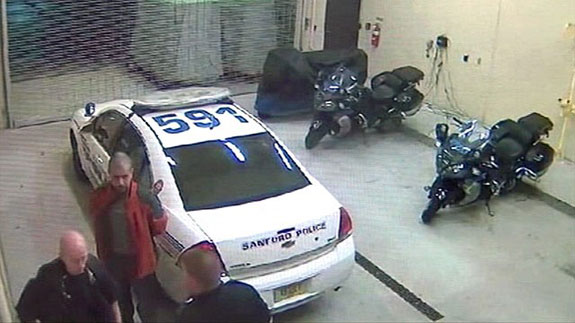
In a police video from the night Trayvon Martin was shot and killed, George Zimmerman does not appear to be wounded. (Screenshot: ABC News.)
By Ashley Lopez
Florida Center for Investigative Reporting
Florida Senate Democratic Leader Chris Smith filed legislation this week that aims to amend the state’s controversial “Stand Your Ground” law, which received media scrutiny following the shooting of 17-year-old Trayvon Martin.
This is the second year in a row that Smith has filed a bill to change Florida’s expansive self-defense law.
The Tampa Bay Times/Miami Herald reports:
Smith’s proposal, SB 122, would prevent individuals from initiating or “unreasonably escalating” a deadly conflict — and then claiming immunity from prosecution under the self-defense law. Immunity would also be denied to individuals who left a place of safety or chased someone down.
“The ‘Last Man Standing’ escape hatch would finally close with the passage of this legislation,” Smith wrote in a press release.
Additionally, Smith’s proposal has language requiring sheriffs and municipal police departments to craft guidelines on neighborhood watch programs.
From the bill text: “The guidelines must include, but not be limited to, prohibiting a neighborhood crime watch patrol participant who is on patrol from confronting or attempting to apprehend a person suspected of improper or unlawful activity except in those circumstances in which a reasonable person would be permitted, authorized, or expected to assist another person.”
Stand Your Ground laws have been backed by gun industry lobbyists and other conservative special industries and have been popping in states all over the country in the past several years.
These laws — which permit people to use lethal force to defend themselves in public – have passed in nearly two dozen states already and were enacted in Florida in 2005.
Typically, people are only allowed to use lethal force in their homes for self-defense. However, these laws allow people to fire a gun in parks and out in the street if they feel threatened.
Research has shown that states with similar laws have higher homicide rates. Those opposed to Stand Your Ground laws say they lead to possible vigilantes like George Zimmerman, who shot Martin in what he claims was an effort to stand his ground.
Still, a state task force examining Florida’s law — which some allege was initially used to keep Zimmerman out of jail until public outrage forced the state to press charges— announced earlier this year that it will not recommend repealing the controversial law. Instead, the Gov. Rick Scott-appointed task-force recommended that only some changes be made to the law.
There was also an attempt by protesters to get Scott to call a special legislative session to review the law, but after weeks of sit-ins, state lawmakers voted not to hold a special session.
Stand Your Ground gets a lot of public support in the state and the Republican leaders of the legislature have always been vocal about their support of it, as well.
However, Florida House Speaker Will Weatherford, R-Wesley Chapel, has committed to holding hearings about the law in the future.
